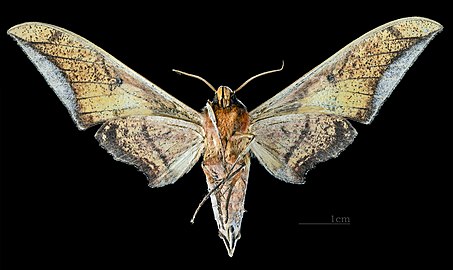
Cechenena helops is a moth of the family Sphingidae first described by Francis Walker in 1856. It is found in Malaysia, Indonesia, the Philippines, Nepal, north-eastern India, Thailand, south-western China and Vietnam.

Theretra japonica is a moth of the family Sphingidae first described by Jean Baptiste Boisduval in 1869.
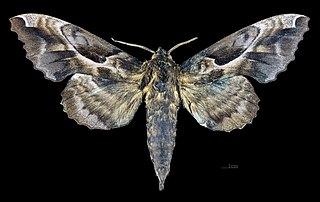
Phyllosphingia is a monotypic moth genus in the family Sphingidae erected by Charles Swinhoe in 1897. Its only species, Phyllosphingia dissimilis, the buff-leaf hawkmoth, was described by Otto Vasilievich Bremer in 1861.

Ambulyx moorei, the cinnamon gliding hawkmoth, is a moth of the family Sphingidae. The species was first described by Frederic Moore in 1858. It is found in Sri Lanka, southern and eastern India, the Nicobar Islands and Andaman Islands, Thailand, Vietnam, southern China, the Philippines, Malaysia, Singapore and Indonesia.

Ambulyx ochracea, the ochreous gliding hawkmoth, is a moth of the family Sphingidae. The species was first described by Arthur Gardiner Butler in 1885.
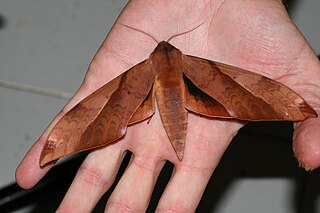
Clanis undulosa, the wavy velvet hawkmoth, is a moth of the family Sphingidae first described by Frederic Moore in 1879. The nominate subspecies is found in the southern Russian Far East, the Korean Peninsula and north-eastern China, as far as south and west as Shaanxi and Hebei. South from Sichuan (Baoxing), Hubei, Jiangxi (Guling) and Zhejiang, it is replaced by ssp. gigantea, which ranges west to Nepal and south, through Thailand and Vietnam, to Peninsular Malaysia.

Acosmeryx castanea is a moth of the family Sphingidae. It was described by Rothschild and Jordan in 1903.
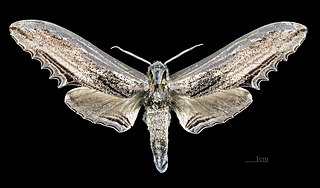
Langia zenzeroides, the apple hawkmoth, is a moth of the family Sphingidae. It was described by Frederic Moore in 1872.
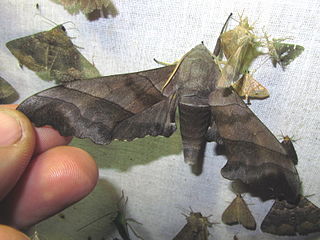
Polyptychus trilineatus, the common crenulate hawkmoth, is a moth of the family Sphingidae. It is known from large parts of South Asia.
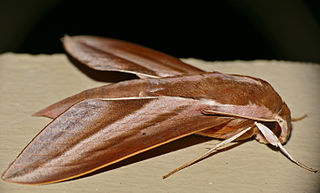
Theretra suffusa is a moth of the family Sphingidae.

Rhagastis castor is a moth of the family Sphingidae first described by Francis Walker in 1856.

Rhagastis albomarginatus is a moth of the family Sphingidae.

Cechenena subangustata is a moth of the family Sphingidae.

Meganoton analis, the grey double-bristled hawkmoth, is a moth of the family Sphingidae. It is known from India, Nepal, southern and eastern China, northern Thailand, northern Vietnam, Peninsular Malaysia, Indonesia, Taiwan, the southern part of the Russian Far East, South Korea and Japan.
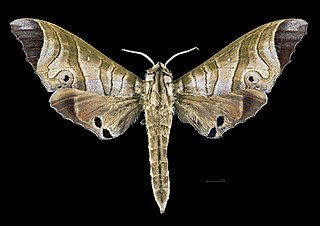
Marumba saishiuana is a species of moth of the family Sphingidae.

Ambulyx kuangtungensis is a species of moth of the family Sphingidae first described by Rudolf Mell in 1922.

Ambulyx liturata is a species of moth of the family Sphingidae first described by Arthur Gardiner Butler in 1875.

Ambulyx semiplacida is a species of moth of the family Sphingidae first described by Hiroshi Inoue in 1990.

Ambulyx sericeipennis, the common gliding hawkmoth, is a species of moth of the family Sphingidae first described by Arthur Gardiner Butler in 1875. It is found from northern Pakistan and northern India eastwards across Nepal, Sikkim, Bhutan, Myanmar, Thailand, Laos, Cambodia and Vietnam to central and southern China and Taiwan.
Ambulyx tobii is a species of moth of the family Sphingidae first described by Hiroshi Inoue in 1976. It is found from Japan and South Korea down through eastern China to Bhutan, Tibet, Yunnan, Vietnam and Taiwan.




